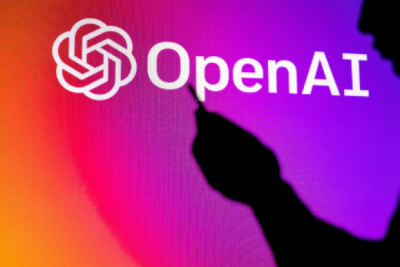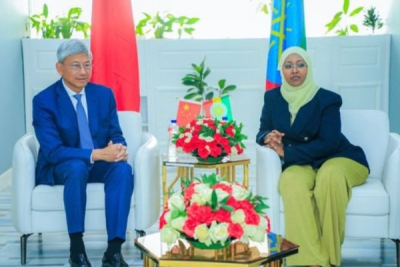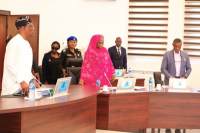
News (1792)
Throughout 2024, Côte d’Ivoire implemented several projects aimed at enhancing digital inclusion for its population. However, challenges remain.
On Monday, November 25, Côte d’Ivoire's Ministry of Digital Transition and Digitalization announced that its budget had been approved by the National Assembly's Economic and Financial Affairs Commission. Valued at 60.78 billion CFA francs (approximately $96.8 million), the budget aims to enhance connectivity, ensure equitable access to technology, promote digital skills, and support youth and women in the digital sector.
The budget includes 8.1 billion CFA francs to investments, 5.7 billion CFA francs to personnel expenses, 1.9 billion CFA francs for general administration, 19.9 billion CFA francs for the digital economy and postal services, 35.5 billion CFA francs for rural technology development, and 4.6 billion CFA francs to support activities in the electronic communications sector.
To achieve its goals, the ministry has outlined a series of initiatives. These include advancing the implementation of the E-Government Strengthening Support Project (PARAE), training 265 specialists in information and communication technologies, organizing the Ivoiretech forum, and bolstering state employees’ proficiency in digital tools.
Minister of Digital Transition and Digitalization Kalil Konaté highlighted key priorities such as fostering an innovative digital ecosystem, bridging the digital divide through rural investments, and strengthening ICT regulations to ensure secure development.
Côte d’Ivoire's digital progress is evident in recent metrics. According to the International Telecommunication Union, the country achieved a 2024 ICT development index score of 65.3 out of 100. Its online administration development index improved to 0.5587 out of 1 in 2024, up from 0.5467 in 2022.
By Adoni Conrad Quenum,
Editing by Sèna D. B. de Sodji
In 2016, Guinean authorities intensified efforts to take control of the country’s top-level domain. At the time, the resource was managed by the U.S.-based registry PSGNet.
The Guinean government has completed the repatriation of its national top-level domain, .GN, marking the end of "over 20 years of effort and determination." The Ministry of Posts, Telecommunications, and Digital Economy announced on Wednesday, November 27, that the official launch is scheduled for December 4.
Discussions to repatriate management of the domain, previously overseen by U.S.-based registry PSGNet, began in 2016. A key milestone came in 2017 with a decree signed by then-President Alpha Condé, which established rules for the technical and administrative management of the national Internet domain. In January 2022, Aminata Kaba, then Minister of Posts, Telecommunications, and Digital Economy, was tasked with securing Guinea's control over its domain.
This achievement is significant for Guinea’s digital sovereignty, as the country has identified digital transformation as a cornerstone of its socio-economic development. Local management of the domain is expected to bolster national cybersecurity, especially in an era of rapid technological change. In the Global Cybersecurity Index 2024 by the International Telecommunication Union (ITU), Guinea is classified as a Tier 3 country, indicating a "basic commitment to cybersecurity" with a score of at least 55/100.
“The world we live in is profoundly shaped by technology, and the future of our independence largely depends on our ability to control our digital infrastructure. Guinea must, more than ever, carve its own path in technological development by safeguarding its data, fostering local innovation, and ensuring equitable access to information and digital services for all its citizens,” said Rose Pola Pricemou, Minister of Posts, Telecommunications, and Digital Economy, in the October edition of the ministry’s Digital Bulletin.
By Isaac K. Kassouwi
Editing by Sèna D. B. de Sodji
Without robust security measures, digital transformation in Africa risks failure. In Congo, where significant investments are driving ICT growth, a strong focus on digital security is placed on protecting online users and safeguarding critical systems.
Léon Juste Ibombo (photo), Congo's Minister of Posts, Telecommunications, and the Digital Economy, delivered the keynote address on Monday, November 25, at the second edition of the Brazza Cybersecurity Forum. He emphasized the critical importance of digital security in light of the exponential rise in cyber threats across all sectors and affirmed that cybersecurity lies at the heart of Congo's strategic development.
"Cybersecurity is no longer optional but an imperative in an increasingly connected world," Ibombo said.
In recent months, Congo has ramped up strategic partnerships as part of its national digital transformation strategy, "Congo Digital 2025." Although cybersecurity is a priority within this initiative, the country remains behind in this domain. According to the Global Cybersecurity Index 2024 published by the International Telecommunication Union (ITU), Congo is ranked in Tier 4 with a score of 27.61 out of 100, highlighting significant gaps in digital protection and underscoring the urgency to accelerate efforts. It was thus placed in the “Evolving” category.
"Evolving represents countries that obtained an overall score of at least 20/100 by demonstrating a basic cybersecurity commitment to government-driven actions that encompass evaluating, establishing or implementing certain generally accepted cybersecurity measures in at least one pillar, or several indicators and/or sub-indicators," the ITU explained in its report.
Congo lags in four of the five pillars comprising the index. While it scored 14.12 out of 20 in legal measures, it earned a dismal 0 out of 20 in technical measures, 0.72 in capacity building, 3.9 in organizational measures, and 8.87 in cooperation with regional, continental, and global partners.
To achieve its goal of becoming a technology hub, Congolese authorities must prioritize several actions. These include establishing technical infrastructures such as Computer Emergency Response Teams (CERT/CSIRT) and cybersecurity threat protection measures, investing in education, awareness, and research to build cybersecurity skills, and forging international and regional partnerships to combat cyber threats. Active participation in agreements and collaborative initiatives will also be essential.
Adoni Conrad Quenum
Artificial intelligence (AI) is rapidly transforming industries worldwide. While Africa stands to benefit significantly from its advancements, the limited integration of African languages into AI systems poses a major obstacle to its full potential.
Orange announced, yesterday, a partnership with OpenAI and Meta to advance this initiative. The project, set to launch in the first half of 2025, aims to develop AI systems capable of recognizing and interacting with African languages.
West African languages such as Wolof and Pulaar will be the first to be included in the project. These languages will be integrated into OpenAI's Whisper and Meta's Llama technologies, which specialize in language recognition and translation.
Current AI models are predominantly trained using English-language data, which limits their capacity to support African languages. The underrepresentation stems from the scarcity of data available in these languages. To address this gap, Orange will contribute data from its local applications, particularly those used in customer service, to enhance AI processing of African languages.
One of the key objectives is to allow Orange users to interact with customer service in their native languages, making the user experience more seamless and accessible. The advancements achieved through this collaboration will extend beyond Orange’s services. The AI models developed will also be made available for non-commercial use, supporting public health and education initiatives.
By Servan Ahougnon
Editing by Sèna D. B. de Sodji
To bolster its digital transformation efforts, Ethiopia is forging strategic partnerships, including closer ties with an Asian country on cybersecurity matters.
Tigist Hamid (photo, right), Director General of the Information Network Security Administration (INSA), recently met with Chen Hai (photo, left), China's Ambassador to Ethiopia. According to the Ethiopian News Agency, which revealed the meeting on Monday, November 25, the discussions focused on cybersecurity.
The news agency reveals that Tigist Hamid presented the Chinese official with "cybersecurity products and services provided by the administration as well as ongoing efforts to enhance the country's cybersecurity infrastructure." She also highlighted the need for sustained support and collaboration between the Ethiopian and Chinese governments in the field of cybersecurity.
Ethiopia is currently ranked as a Tier 3 country on the International Telecommunication Union's (ITU) Global Cybersecurity Index, with a score of 76.34 out of 100. This ranking reflects a basic level of commitment to cybersecurity, as measured by public initiatives to evaluate, establish, or implement generally accepted measures across a moderate range of indicators.
China, by comparison, scored 91.64 out of 100 in the 2024 index, placing it in the Tier 2 category. While not among the leading nations in cybersecurity, China’s advanced expertise and its influential tech companies—such as Huawei, ZTE, Tencent, and Xiaomi—could prove valuable for Ethiopia as it seeks to strengthen its digital defenses.
Adoni Conrad Quenum
Language diversity in Africa often limits digital inclusion. Offering technologies in local languages simplifies access, encouraging adoption and broader use, which bridges the digital divide.
French multinational telecom Orange has announced a partnership with OpenAI and Meta to develop AI Large Language Models (LLMs) tailored to understanding regional African languages. Announced on November 26, the initiative will utilize OpenAI's Whisper and Meta's Llama platforms to address the underrepresentation of African languages in AI systems.
“Orange’s long-term goal is to work with many AI technology providers to enable future models to recognize all African languages spoken and written across Orange’s 18-country footprint in the region,” the release stated.
The project, set to launch in 2025, will initially focus on enhancing customer interactions in Wolof and Pulaar, spoken by millions in West Africa, and extend Orange’s digital inclusion efforts. These models will also be available for non-commercial use in public health and education.
Most existing AI models primarily cater to widely spoken languages, leaving millions of African language speakers without representation in digital systems. Orange's collaboration with OpenAI and Meta to develop AI models for African languages tackles a significant barrier to digital inclusion.
By enabling technology to communicate in local languages, the partnership promotes inclusive innovation and aligns with global efforts to ensure digital access for underserved populations.
Hikmatu Bilali
Guinean and Sierra Leonean authorities have held several meetings since July as part of negotiations to advance a digital interconnection project. These discussions have laid the groundwork for collaboration between the two countries.
Rose Pola Pricemou, Guinea’s Minister of Posts, Telecommunications, and Digital Economy, and Salima Monorma Bah, Sierra Leone’s Minister of Communication, Technology, and Innovation, signed a framework agreement on Friday, November 22, in Freetown to enhance digital interconnection between their two nations.
The agreement focuses on linking the internet backbones of the two countries, aiming to improve connectivity and facilitate digital exchanges. It builds on discussions launched during the China-Africa Digital Summit in July. In August, a Sierra Leonean delegation led by Minister Monorma Bah visited Guinea to refine the technical framework of the partnership.
According to Minister Pricemou, the initiative is expected to harmonize postal policies to improve essential services for the population—particularly in rural areas—while making networks more robust and reliable. This should reduce costs, enhance the quality of digital services, and foster a dynamic digital ecosystem. It also seeks to encourage collaborative initiatives in fields like big data and cybersecurity.
As of early 2024, Guinea had 4.87 million internet users, representing an internet penetration rate of 33.9%, according to DataReportal. Sierra Leone, in comparison, recorded 2.7 million users and a penetration rate of 30.4%.
Cost remains a barrier in both countries. In Guinea, a monthly high-speed data package (at least 5 GB at 256 Kbps or higher) required 8.1% of the average gross national income per capita in 2023, according to the International Telecommunication Union (ITU). In Sierra Leone, the same metric stood at 38.2% in 2017, underscoring the challenge of affordable access in the region.
Adoni Conrad Quenum
Africa is the continent with the most expensive mobile internet in the world, according to the International Telecommunication Union (ITU). On average, African populations spend 4.9% of their monthly gross national income (GNI) per capita to access a standard monthly internet plan, compared to the global average of just 1.3%.
In 2023, mobile internet costs in West Africa were most affordable in Nigeria, Ghana, and Côte d’Ivoire, according to data from the International Telecommunication Union (ITU), the UN’s specialized agency for information and communication technologies.
In Nigeria, accessing the cheapest mobile broadband plan offering at least 2GB of data per month using 3G technology required 1.61% of the monthly gross national income (GNI) per capita. In Ghana and Côte d’Ivoire, the cost was 1.94% and 2%, respectively, of the monthly GNI per capita. The ITU considers internet affordable when its cost is equal to or less than 2% of monthly GNI per capita. In West Africa, only Nigeria, Ghana, and Côte d’Ivoire met this benchmark in 2023. Across Africa, the average stood at 4.9% of monthly GNI per capita. Senegal (2.47%) and Mauritania (3.01%) were below this average but still above the affordability threshold.
In contrast, Guinea-Bissau, Burkina Faso, and The Gambia had the highest mobile internet costs in the region. Residents of these countries had to spend 9.79%, 9.81%, and 11% of their monthly GNI per capita, respectively, to access the same type of mobile broadband plan.
Factors Behind High Costs
Various factors contribute to the high cost of internet in these countries. According to the State of Broadband 2024: Leveraging AI for Universal Connectivity report published in June 2024 by the Broadband Commission, lack of affordability remains a significant barrier to internet access, especially in low-income economies. The report adds that compared to prices in high-income economies, the cost of mobile broadband services is 5.5 times less affordable in lower-middle-income countries and over 20 times less affordable in low-income countries.
The State of Mobile Internet Connectivity 2024 report from the Global System for Mobile Communications Association (GSMA) notes that Sub-Saharan Africa has the highest coverage gap globally, at 13%. This is largely due to the lack of telecommunications infrastructure, which forces some markets to impose high tariffs to make the most of limited resources. "Fixed broadband networks are very expensive to deploy, maintain, and upgrade, especially considering geography and the vast areas that need coverage," the ITU highlighted.
Adoni Conrad Quenum
Digital transformation is a key priority for the Beninese government. For instance, the administration plans to allocate a budget of 16.4 billion CFA francs to digital projects in 2025.
Benin's government plans to connect an additional 18 municipalities to fiber-optic networks by mid-2025, as part of its broader goal to expand high-speed internet access to all 77 municipalities nationwide. The announcement was made by Digital Economy and Digitalization Minister Aurélie Adam Soulé Zoumarou during a November 21 television program.
The deployment of fiber optics in these new municipalities will strengthen the national backbone, which currently links 50 municipalities via approximately 2,550 kilometers of fiber. The government aims to extend this network to a total of 3,300 kilometers. Additionally, nine municipalities will be connected through alternative technologies.
These efforts are part of a larger project to deploy high-speed and ultra-high-speed internet across Benin. This initiative, with an estimated cost of 207 billion CFA francs ($330.63 million), is a cornerstone of the government's 2021-2026 Action Plan. The government aims to position Benin as "West Africa's digital service platform, accelerating growth and fostering social inclusion."
Improving Coverage and Adoption
The project has the potential to significantly enhance telecommunications coverage, particularly internet access, nationwide. The government claims 4G network coverage already reaches approximately 90% of the population, a figure supported by the International Telecommunication Union's (ITU) ICT DataHub. ITU also reports that 2G and 3G networks cover 98% and 90% of the population, respectively, while 5G services are in the early stages of commercialization.
In June 2024, the Regulatory Authority for Electronic Communications and Postal Services (ARCEP) reported 11.06 million mobile internet subscribers and 20,000 fixed internet users. With a population estimated at around 13.7 million (World Bank, 2023), mobile telephony subscriptions stand at 17.8 million, while fixed-line telephony subscriptions are limited to 1,363. However, ITU data indicates internet and mobile penetration rates of 33.8% and 53.9%, respectively, as of the end of 2023.
Isaac K. Kassouwi
Nigerian states are ramping up initiatives to accelerate their digital transformation in line with the federal government's objectives. This effort spans all sectors of the economy, including education.
In Nigeria, the Federal Capital Territory (FCT) plans to distribute over 1,000 laptops to its secondary schools. Valued at approximately 990 million naira (around $589,000), the acquisition was approved by the FCT Executive Council during a meeting on Monday, November 25.
According to Danlami Hayyo, the FCT Secretary for Education, the laptops will come preloaded with educational content and learning materials focused on vocational skills.
“FCT schools will now transform into the digital education system, we will now move from normal teaching and learning classroom to media education system of learning,” said Chidi Amadi, Chief of Staff to the FCT Minister.
The laptop acquisition is part of a broader strategy to digitize the education system and improve teaching quality in the FCT. The Executive Council recently approved a contract for procuring examination materials. Earlier, in September, the FCT launched a program to train 3,000 primary school teachers in digital teaching methods.
The United Nations Educational, Scientific, and Cultural Organization (UNESCO) highlights two key benefits of digital technology in education. “First, it can improve instruction by addressing quality gaps, increasing available time and opportunities to practise, and personalizing instruction. Second, it can engage learners by varying how content is represented, stimulating interaction and prompting collaboration,” according to the 2023 Global Education Monitoring Report.
Isaac K. Kassouwi
More...
Guinea, confronted with the need for administrative modernization, is turning to digital solutions to streamline its processes. This initiative represents a significant step forward in public resource management, prioritizing innovation and international cooperation.
Guinea is looking to Rwanda as a model for its first-ever digital public procurement system. A strategic agreement was signed on Wednesday between the Guinean government and the Rwanda Cooperation Initiative (RCI).
“We have proven expertise in digitizing public procurement, particularly in public financial management, and it is this experience we aim to share with Guinea. We signed this contract to formalize our commitment and support the country in establishing its digital system,” said Patricie Uwase, Director-General of the Rwanda Cooperation Initiative.
This agreement builds on a collaboration that began in 2023 between RCI and Guinea as part of the E-Procurement project. Championed by the transitional president, Mamady Doumbouya, the project seeks to enhance transparency, improve administrative efficiency, and optimize public resource management. It is also a critical tool in the fight against corruption—a persistent issue in Guinea’s public procurement sector, frequently criticized for its lack of transparency and questionable practices.
The new digital system aims to simplify and tighten control over procurement processes, ensuring greater traceability of transactions. Additionally, the digitization of public procurement is expected to reduce both delays and associated costs while boosting the confidence of foreign investors drawn to transparent and modern administrative practices.
By leveraging Rwanda’s recognized expertise, Guinea hopes to lay the groundwork for effective and transparent governance. If successful, this initiative could redefine public procurement standards in West Africa, positioning Guinea as a model for digital innovation and anti-corruption efforts. The government is targeting swift implementation, aiming for full digitalization of all public procurement plans by January 1.
Samira Njoya
Africa's cultural heritage, encompassing ancient artifacts, oral traditions, music, and manuscripts, forms the backbone of its identity. With thousands of artifacts at risk due to environmental degradation, conflict, and illegal looting, digitization safeguards against loss.
Telecommunications tower company IHS Nigeria announced, on November 21, a partnership with the National Commission for Museums and Monuments (NCMM) and the Federal Ministry of Art, Culture, and the Creative Economy (FMACCE) to digitize Nigeria’s cultural heritage. This collaboration seeks to preserve and showcase the nation’s historical artifacts and cultural monuments through a cutting-edge digital museum platform.
Speaking on the initiative, Mohamad Darwish, CEO of IHS Nigeria, emphasized the company’s dedication to cultural preservation and community development. “As a company deeply rooted in Nigeria, we recognize the importance of preserving, protecting, and promoting our cultural heritage,” he said.
The digital museum, the first major project under Nigeria’s Digital Culture Initiative, aims to provide greater public access to the country’s rich cultural heritage. Leveraging advanced technology, the initiative will ensure that Nigeria’s historical and artistic treasures are preserved and made accessible to a global audience.
The initiative aligns with President Bola Ahmed Tinubu's Renewed Hope program, which aims to promote Nigeria's rich cultural heritage, diverse tourism landscape, and creative potential to catalyze economic growth in these key sectors. The program aims to strengthen communities, create sustainable jobs, and reinforce Nigeria's position on the world stage.
According to Olugbile Holloway, Director General of the National Commission on Museums and Monuments, “We believe that to keep ahead of current trends and attract a younger demographic, it is imperative to create and make available to the public a digital experience of our rich cultural heritage. The digital museum will be an invaluable resource for researchers, students, and the general public, both in Nigeria and worldwide, and will play a crucial role in the preservation of our national heritage.”
Hikmatu Bilali
Nigerian states are ramping up initiatives to accelerate their digital transformation in line with the federal government's objectives. Earlier this month, Anambra State approved a project to deploy a data management platform.
The Bauchi State government in Nigeria has partnered with Galaxy Backbone (GBB), a state-owned company specializing in ICT solutions and services, to strengthen digital infrastructure and expand the use of information and communication technologies (ICT) across the state. The two parties signed a memorandum of understanding (MoU) last week to formalize this collaboration.
The partnership aims to enhance connectivity, build local ICT skills, provide specialized consulting services, and offer hosted ICT solutions. These initiatives are part of broader efforts to modernize governance and improve the delivery of public services in Bauchi State. To achieve these goals, GBB will leverage its data centers located in Abuja and Kano.
This agreement aligns with Governor Bala Abdulkadir Mohammed's vision to transform Bauchi State into "a hub of digital innovation, ensuring efficient governance and improved service delivery for our citizens." As part of this vision, the state is working on digitizing its education system through the implementation of a Teacher Management Information System (TMIS) and an Education Management Information System.
The collaboration is expected "to lead to an enhancement of Bauchi State’s ICT Infrastructure, through GBB’s resources and expertise, deepen training and consultancy services, while, enhancing economic growth to attract investments, create jobs, and drive economic opportunities through improved digital connectivity and service delivery within the state," GBB said in a statement.
This initiative also contributes to Nigeria's broader digital transformation, as Africa’s digital economy is projected to be worth at least $712 billion by 2050, accounting for 8.5% of the continent’s GDP, according to a joint study by the International Finance Corporation (IFC) and Google. In Nigeria, the ICT sector contributed 19.78% to real GDP in the second quarter of 2024, according to data from the National Bureau of Statistics (NBS).
Isaac K. Kassouwi
The digital revolution is profoundly reshaping African economies, with technological infrastructure at the heart of this transformation. In this context, data centers are emerging as critical drivers, ensuring access to efficient and sovereign digital services.
Cameroonian cloud service provider ST DIGITAL launched the construction of its Tier 3 data center on Friday, November 22, at the VITIB technology park in Grand-Bassam, Côte d’Ivoire. This strategic project aims to bolster the country's digital sovereignty and meet the growing demand for advanced digital services.
"Our data center, spanning 4,000 square meters, will be a high-security, state-of-the-art, eco-friendly infrastructure with a reduced carbon footprint. We’ve even planned innovative initiatives such as creating artificial lakes and vegetable gardens using outputs from the air-conditioning systems," said Steve Tchouaga, CEO of ST DIGITAL.
This initiative comes as digital transformation accelerates across Africa, accompanied by a surge in cloud adoption. According to PwC's Africa Cloud Business Survey 2023, published in February 2024, 50% of African businesses have already integrated cloud technology into their operations, and 61% plan to fully transition by 2026.
Set to be operational by the end of the first quarter of 2025, the new data center will offer cutting-edge services, including modular colocation spaces, a landing station for submarine cables, and infrastructure designed for artificial intelligence. For Côte d’Ivoire, the facility represents a strategic lever to fast-track digital transformation, foster the local economy, and position Grand-Bassam as a leading tech hub in West Africa, driving innovation and attracting new investments.
Samira Njoya















